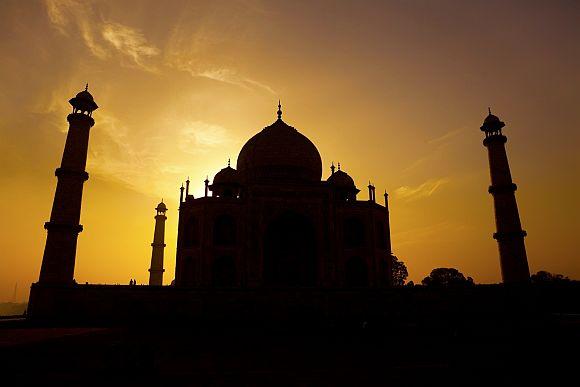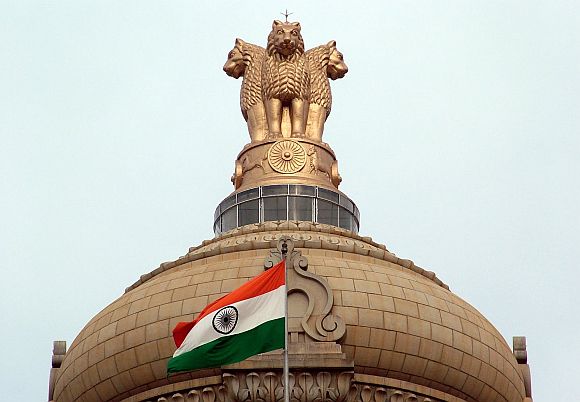Rediff.com's Arthur J Pais recently attended a symposium held to mark the 20th anniversary of Centre for the Advanced Study of India, which reflected critically on the processes and forces that have driven transformations in India, their dynamics, limitations and the new challenges that these changes pose for India in the next few decades.
The ubiquitous file that passes from one tier to another in India may not go away easily, but many bureaucrats would like to see the end of the File Raj.
At a symposium held to mark the 20th anniversary of Centre for the Advanced Study of India, which is based at the University of Pennsylvania and is the first and only research organisation in America fully devoted to Indian studies, Planning Commission deputy chairman Montek Singh Ahluwalia spoke about the bottlenecks created by the file system and other issues in a video interview with Professor Devesh Kapur.
Ahluwalia suggested that as the file kept moving from one tier to another, a lot of delay ensued because an official would worry about how his decision would be reviewed by a senior. The best way to tackle the bureaucratic clogging would be to get top-level bureaucrats from concerned departments and hold an open discussion.
Titled India: Two Decades of Transformation, the symposium -- which looked at a number of issues affecting India and America, including security and bilateral trade and business opportunities -- was also addressed by Indian Ambassador to the United States Nirupama Rao.
...
'India's engagement with the world has transformed'
'The symposium also marks two decades of major transformations in India,' said Kapur, director, CASI, and the Madan Lal Sobti, associate professor for the study of contemporary India at University of Penn.
'Perforce we tend to focus on the present, the issue of the day driven by the 24-hour news cycle, one crisis to the next. This symposium is hopefully something quite different -- an opportunity to step back and reflect critically on these 20 years, on the processes and forces that have driven these transformations in India, their dynamics, limitations and the new challenges that these changes pose for India in the next few decades.'
Some of the transformations, he said, were obvious -- growth that 'has been nearly twice the world average,' the telecommunication sector boom, and the success of India's services sector, 'epitomised by the remarkable success of the IT sector.'
Perhaps the most significant change, he said, had been attitudinal, especially reflected in the transformation in India's engagement with the world.
'In 1990, India had one of the world's most closed economies with a trade-to-GDP ratio lower than in 1950,' he added. 'Greater market orientation and openness to the world economy have resulted in a very significant increase in the openness of the economy. The share of exports in GDP has tripled between 1990 and 2010 from just 7 percent of GDP to 22 per cent, while imports increased even further. India's share in global trade has more than tripled in the last two decades, but it is still hugely lagging China.'
...
... but India's agriculture growth has been anaemic
Ahluwalia said that when India began loosening the restrictions on external trade and a number of domestic industrial controls, 'expectations exploded,' and many benefitted. But, he conceded, there was resentment that the reforms had benefitted some more than the others.
Kapur also pointed out the limitations of these massive shifts, especially that the parallel strengthening of the institutions that underpin a market economy did not occur. As a recent headline put it, India may have more billionaires than the United Kingdom, but it has more poor than all of Africa.
'Broadly one can say income inequality has increased while poverty has declined,' he said. 'Added to this is the fact that changes have varied significantly across regions and social groups -- and all of this is producing new tensions.'
'Although agriculture now accounts for less than one-sixth of GDP it still accounts for half of all employment. And agriculture growth has been anaemic.'
'Equally India's pattern of growth appears to have bypassed the normal sequence of economic development, moving from agriculture to manufacturing and then to services.'
...
'There are real fears of crony capitalism in India'
'The failure of India's rapid growth to create substantial numbers of jobs in low-skilled manufacturing that can absorb India's rapidly expanding labour force remains one of the biggest weaknesses of the Indian economy.'
'There are real fears of crony capitalism in India, Kapur said, 'especially in sectors with high regulatory intensity such as land, mining, spectrum, forests. This has both undermined competition as well as the legitimacy of the economic model itself.'
Kapur also discussed India's population problem. In the two decades after the onset of economic liberalisation, he said, India had added 364 million people -- more than the stock at the time of Independence, a stock accumulated over many millennia, more than the population of the US, in a land mass about 1/3rd that of the US, in just 20 years.
'That means that tens of millions of young people will be joining India's work force,' he said, 'One out of four workers joining the global work force this decade will be Indian. They will be increasingly urban, interconnected and informed with aspirations that their parents couldn't even dream about -- managing their expectations will be no mean task.'
The recent hike in diesel prices in India came for discussion, with one participant -- lawyer Zia Mody, founder and senior partner, AZB and Partners -- complimenting the federal government for not backing off from the hike in the face of popular resistance.
...
Bureaucrats in India are afraid to take a decision with a scandal facing them
Deepak Parekh, chairman, Housing Development and Finance Corporation, decried the indiscriminate subsidy schemes in India.
While diesel subsidy was being reduced, Parekh said, it was going to stay, and hoped that the new-found courage to take decisions in the face of popular sentiments will give 'some impetus' to more reforms.
A better functioning Parliament where debates decide the issues, and not street demonstrations and strikes, would also immensely help economic progress, he suggested.
Parekh also spoke about the need for a more effective judiciary in India. Though financial scandals are not confined to India alone, he said, while corrective methods are put in place in other countries after the outburst of scandals, in India everything seems to come to a standstill.
Claiming that bureaucrats in India were afraid to take a decision with a scandal facing them, he said if the court system was reformed with zeal, the judiciary could seek to redress many problems affecting not only business and administration, but life in general.
Pointing to the large number of pending cases, he also wondered why more courts are not built and more judges not appointed.
Click on MORE for part 2 of the series...






article